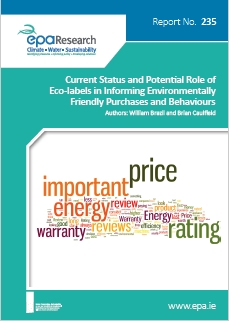Authors: William Brazil, Brian Caulfield
Summary: Eco-labels are a widely used means of providing consumers with information regarding the environmental and energy impacts associated with various products and services. Given the opportunity that such labels represent, and the resources devoted to creating them, there is a need to ensure that they are effectively communicating the relevant information to the general public.

Managing our energy use, and the environmental impacts associated with it, is essential to both sustainable development and the protection of our ecosystems. Eco-labels provide a means of informing members of the general public about the energy use and environmental impacts associated with a number of products available to them. Legislation requires the provision of information in sectors such as white goods, housing and new car sales across the European Union. As many of the impacts associated with the operation of goods and properties are not highly visible to owners and operators, eco-labels provide one of the very few methods available to inform consumers about the effects of their behaviours and choices. Specifically, information on factors such as carbon dioxide emissions, energy use, noise pollution and water use may not be readily available to consumers, and therefore such labels are needed both to inform consumers and to nudge them towards products with more sustainable operational lifecycles. In light of this potential to inform consumer behaviour, it is important that such labels are operating as desired and that an important opportunity to highlight environmental issues is not being lost. This research found that while consumers appear to be engaging with energy labels and using them to inform their purchases, individuals are not successfully retaining all the information such labels contain. This indicates that while labels may be considered to be playing an important role, there is scope to undertake redesign efforts to ensure all the required information is being transmitted in a more effective manner.
The provision of environmental information, either in the form of European Union energy labels, or Building Energy Certificates is mandated across a number of sectors by multiple European Union directives such as Directive 2010/30/EU and Directive 1999/94/EC. Such directives place a responsibility on suppliers and retailers to create and display such information, and failure to do so is considered to be an offence. To ensure that the resource expenditure associated with eco-labels is justified, it is important to examine their effectiveness as a means of informing and promoting sustainable consumption. The consumer engagement research undertaken by this project, both in the form of the ranked preference experiment and the eye-tracking studies, highlights that current policy, specifically with regard to the provision of information via EU energy labels, appears to be effective in terms of informing consumer choices and making energy information more salient to consumers, however there is a need to examine potential improvements, specifically with regard to information display techniques.
The research examined the role of eco-labels in consumer choices via the use of both an online survey and a series of novel eye-tracking experiments. Multiple analysis and data collection techniques were used, including the modelling of consumer choices via conjoint analysis, hypothetical choice scenarios and information recollection tasks. The research included an examination of the role of environmental information in tandem with other product attributes in informing consumers’ purchases, as well as an assessment of the individual components of labels, and the means they employ to transmit information. The report provides recommendations on the current approaches in eco-labelling and the potential expansion of such schemes.
https://www.epa.ie/media/epa-2020/publications/research/Research_235_thumbnail[1].jpg